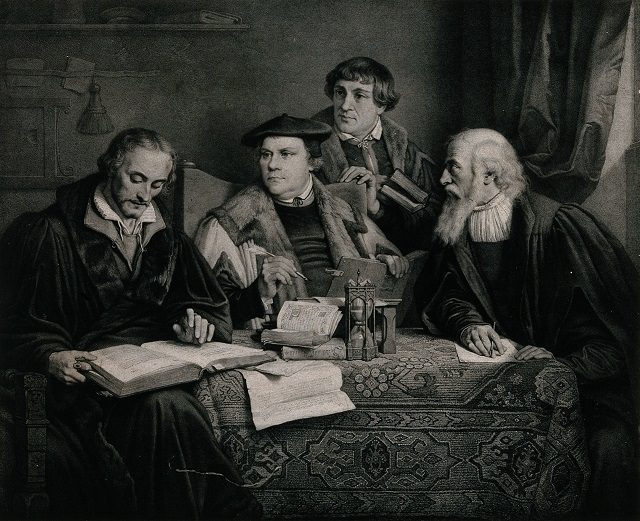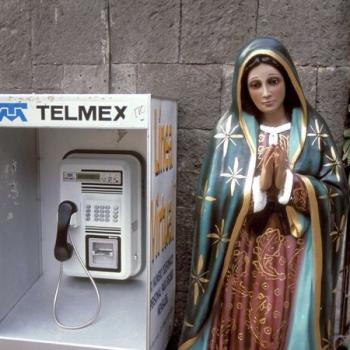(including St. Irenaeus’ View on the Rule of Faith)

Rev. Dr. Eric G. Phillips (LCMS) replied to my post, Lutheran Chemnitz Wrong Re Fathers & Sola Scriptura (mostly dealing with St. Irenaeus and Tertullian) on my public Facebook page. We discussed St. Irenaeus’ views and the alleged biblical support for sola Scriptura (which I contend is non-existent). His words will be in blue.
*****
Response to the first third of that, because I don’t have time to read (let alone respond to!) the whole thing:
Irenaeus goes into the Bishop list of the Church of Rome in order to dispute the Gnostic claim that they possessed secret unwritten apostolic teachings. He argues simply that whatever unwritten tradition there may be, the Catholic Church has it, not the Gnostics. Obviously this particular argument is not concerned with confirming the Scripture. But that’s 1 chapter out of 25 in 1 book out of 3 that Chemnitz quickly characterized as “doing nothing else… than to prove and confirm those articles at length from Scripture.” It’s hardly a revelation that such quick characterizations will involve a little hyperbole, and you are doing a very silly thing when you try to blow this up into some big dilemma for Lutherans.
As to your related objections to specific Lutheran doctrines:
Lutherans do NOT deny that the Apostles appointed bishops, nor that succession of bishops should continue, nor that Peter and Paul established the Church in Rome, nor that the Roman Bishop taught the true faith at the time Irenaeus was writing (nor for quite a long time after that), nor even that the Bishop of Rome could be accorded a primacy among the churches. What we deny is that the distinction between bishops and pastors is a matter of divine institution and of the essence of the Church. That, along with the Roman Primacy, is de iure humano, not de iure divino.
The Treatise on the Power and Primacy of the Pope (one of the shortest of our Confessional documents) would be useful reading for you.
Thanks for your reply.
I understand and agree with all those things you say Lutherans believe. But Lutherans deny (very unlike Irenaeus and virtually all of the fathers — if not literally all –) that there is such a thing as an infallible Church and an infallible tradition. That is of the essence of sola Scriptura: your rule of faith, no?
You deny apostolic succession in terms of what I would contend is its deepest, most essential patristic meaning: that this succession preserves the infallible tradition, as infallibly determined or verified by the infallible Church: all in perfect harmony with inspired Scripture.
Lutherans always have the option of saying: “tradition X that was held by most or all of the fathers was wrong, because Scripture teaches contrary teachings a, b, c . . .”
But Catholics hold to unanimous consent of the Fathers (i.e., substantial consensus) as indicative of an infallible tradition to be preserved.
. . . nor that the Roman Bishop taught the true faith at the time Irenaeus was writing (nor for quite a long time after that), . . .
which of course insinuates that we ceased to teach the true faith, which overthrows the biblical teachings of indefectibility and apostolic succession.
This is precisely why the unbiblical novelty of sola Scriptura had to be introduced, because there had to be (in order to justify the Revolt) an alternative to the teaching that had always been held: the three-legged stool of Bible-Church-Tradition (all infallible) along with apostolic succession.
Thus, Protestants started denying the infallibility of apostolic tradition and the Church (including that of ecumenical councils), and essentially changed the meaning of apostolic succession, and started holding that Scripture is the only infallible norm of faith.
The question then becomes, “where in Scripture is such a new doctrine as sola Scriptura taught?” And the answer is “nowhere.”
Therefore, it’s an arbitrary and unbiblical tradition and self-defeating according to its own criterion of truth or falsity (i.e., conformity to that same Holy Scripture).
You have that backwards. We didn’t elevate Scripture above Tradition because we’d suddenly come to doubt Tradition. The doubting of Tradition was done entirely on the basis of Scripture.
I haven’t found scriptural hostility to authentic, apostolic tradition (nor espousal of sola Scriptura), having studied and written about and debated this issue far more than any other in my 28 years of Catholic apologetics (the last 17 full-time), and as author of two books on the topic [one / two].
I see Jesus condemning pharisaical traditions of men. But there is also an acceptance of apostolic teaching / tradition. Both strains are there: not just the first. I’m right with you and Jesus and Scripture in condemning traditions of men. I think sola Scriptura is the most obviously false and unbiblical tradition of men.
***
Irenaeus did NOT claim that Apostolic Succession guaranteed the infallibility of the Church. That idea goes well beyond him.
What do you say he claimed then, in his appeal to apostolic tradition? If he appeals to it over against the heretics, what good is it, if it is not authoritative and therefore, in effect, infallible?
There’s nothing supernatural in his appeal to Apostolic Succession. The Gnostics said, “The Apostles taught purely oral secrets to their star pupils.” Irenaeus said, “Surely the Bishops they appointed were among their star pupils. Let’s see what they have said, and whether they have propagated these same oral traditions you claim to be propagating.”
Irenaeus teaches de facto infallibility of tradition and the Roman Church here:
Since, however, it would be very tedious, in such a volume as this, to reckon up the successions of all the Churches, we do put to confusion all those who, in whatever manner, whether by an evil self-pleasing, by vainglory, or by blindness and perverse opinion, assemble in unauthorized meetings; [we do this, I say,] by indicating that tradition derived from the apostles, of the very great, the very ancient, and universally known Church founded and organized at Rome by the two most glorious apostles, Peter and Paul; as also [by pointing out] the faith preached to men, which comes down to our time by means of the successions of the bishops. For it is a matter of necessity that every Church should agree with this Church, on account of its pre- eminent authority, that is, the faithful everywhere, inasmuch as the apostolical tradition has been preserved continuously by those [faithful men] who exist everywhere. (Against Heresies, Book III, ch. 3. section 2)
Not remotely.
Does Irenaeus have to use the word “infallible” in order for you to believe that he is referring to infallible, binding, authoritative teachings?
Irenaeus again taught infallibility of the tradition and the succession and Church here (also in my paper):
Wherefore it is incumbent to obey the presbyters who are in the Church, – those who, as I have shown, possess the succession from the apostles; those who, together with the succession of the episcopate, have received the certain gift of truth, according to the good pleasure of the Father. But [it is also incumbent] to hold in suspicion others who depart from the primitive succession, . . . (Against Heresies, Book IV, ch. 26, section 2)
I see that as virtually exactly what St. Paul held as regards the Council of Jerusalem:
Acts 16:4 (RSV) As they went on their way through the cities, they delivered to them for observance the decisions which had been reached by the apostles and elders who were at Jerusalem.
And as he again expressed to Timothy:
1 Timothy 3:15 . . . the household of God, which is the church of the living God, the pillar and bulwark of the truth.
Both of those passages are worlds away from sola Scriptura. They don’t even mention Scripture (though it is ultimately included in that mix).
As long as the Apostles were with us, they taught in speech and letter. Since they haven’t been with us, the letters are what we have of their deposit.
The Church is indeed the bulwark and pillar of the truth, so if it begins to depart from the truth, it is incumbent upon it to return to its Apostolic basis, so that it can do its job.
Irenaeus clearly believes that the Church of Rome up to his own day has done a good job of this. He gives no guarantees that it must always be so.
I’m sure there are unwritten Apostolic traditions preserved in the Liturgy, but no one can separate those traditions from everything that’s happened since. Scripture has been kept pure, and for a REASON.
***
The New Testament is the Apostolic Tradition.
Where does the New Testament claim that it itself is the sum of apostolic tradition? I say that it does not. St. Paul expressly contradicts this, in including oral tradition in his overall mix of binding apostolic traditions to be held by all Christians.
I didn’t say the NT claimed to be the sum of Apostolic teaching.
If you say, “the New Testament is the Apostolic Tradition” what is it you also include in that tradition, if you now deny that you were saying that the NT is the sum of it?
Where in Scripture does it teach that only scriptural teachings are binding, and not extrabiblical apostolic traditions also? If you can’t find it, you have merely given us another extrabiblical tradition of men as part of your rule of faith (which is expressly contrary to that same rule of faith).
You have offered no answer (that I see) to three major (and I think, central to the debate) questions that I asked:
1) Where in Scripture is sola Scriptura taught?
2) If you say, “the New Testament is the Apostolic Tradition” what is it you also include in that tradition, if you now deny that you were saying that the NT is the sum of it?
3) Does Irenaeus have to use the word “infallible” in order for you to believe that he is referring to infallible, binding, authoritative teachings?
And here’s a new question, too: “if it begins to depart from the truth, it is incumbent upon it to return to its Apostolic basis”
Where in Scripture does it ever teach that the one true Church can depart from the truth (or, for that matter, denominations)? And where does it teach that folks in the Church can somehow correct the Church? The Bible I read teaches indefectibility.
1) As I’ve said, the NT is the Apostolic Tradition. It is what the Spirit said to the churches through the Apostles, and was and still is recognized by the Church Catholic as being the very Word of God. No other words we have* are the Word of God. That’s why it has primacy of authority.
2) The NT is the only thing we can be sure is Apostolic.
3) No, of course not. But he has to make a claim for the future, or for an essential character that can be extrapolated into the future. He can’t just make observations about history up to his own time.
*except the OT, of course
I don’t see how these replies — with all due respect — answer my very specific and particular questions, but whatever. Not much more we can say at this point. We’re just talking past each other now.
***
Photo credit: Martin Luther, Philip Melanchthon, Pomeranus and Crucicer around a table, translating the Bible (Lithograph, c. 1860), by P. A. Labouchère (1808-1897) [Wikimedia Commons / Creative Commons Attribution 4.0 International license]
***














